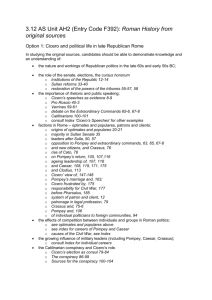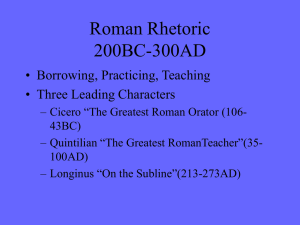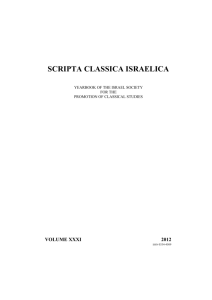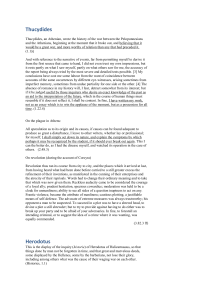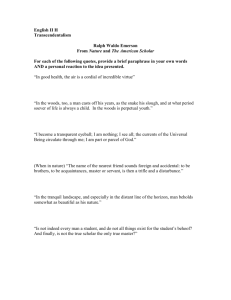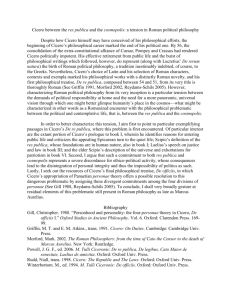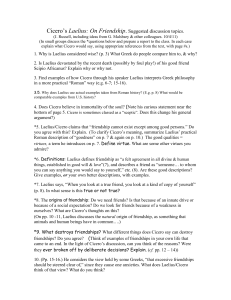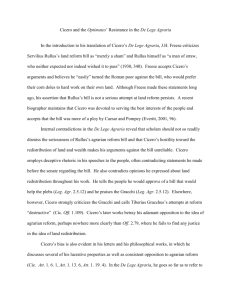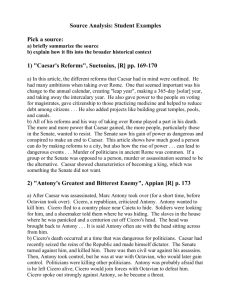Cicero "On Duties"
advertisement
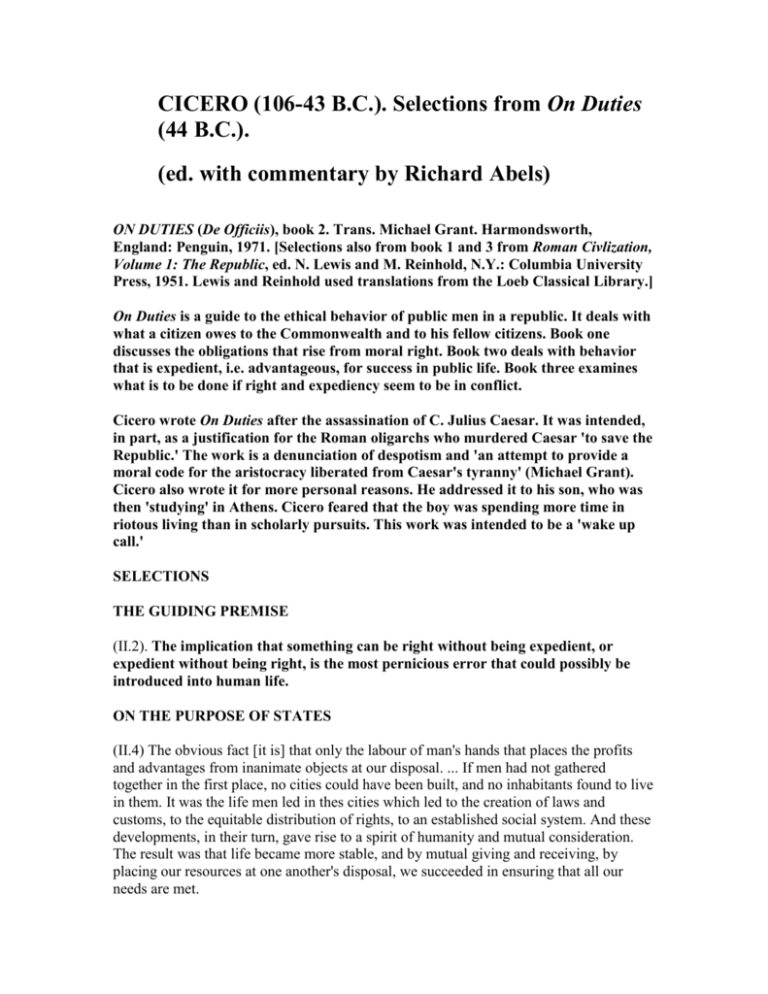
CICERO (106-43 B.C.). Selections from On Duties (44 B.C.). (ed. with commentary by Richard Abels) ON DUTIES (De Officiis), book 2. Trans. Michael Grant. Harmondsworth, England: Penguin, 1971. [Selections also from book 1 and 3 from Roman Civlization, Volume 1: The Republic, ed. N. Lewis and M. Reinhold, N.Y.: Columbia University Press, 1951. Lewis and Reinhold used translations from the Loeb Classical Library.] On Duties is a guide to the ethical behavior of public men in a republic. It deals with what a citizen owes to the Commonwealth and to his fellow citizens. Book one discusses the obligations that rise from moral right. Book two deals with behavior that is expedient, i.e. advantageous, for success in public life. Book three examines what is to be done if right and expediency seem to be in conflict. Cicero wrote On Duties after the assassination of C. Julius Caesar. It was intended, in part, as a justification for the Roman oligarchs who murdered Caesar 'to save the Republic.' The work is a denunciation of despotism and 'an attempt to provide a moral code for the aristocracy liberated from Caesar's tyranny' (Michael Grant). Cicero also wrote it for more personal reasons. He addressed it to his son, who was then 'studying' in Athens. Cicero feared that the boy was spending more time in riotous living than in scholarly pursuits. This work was intended to be a 'wake up call.' SELECTIONS THE GUIDING PREMISE (II.2). The implication that something can be right without being expedient, or expedient without being right, is the most pernicious error that could possibly be introduced into human life. ON THE PURPOSE OF STATES (II.4) The obvious fact [it is] that only the labour of man's hands that places the profits and advantages from inanimate objects at our disposal. ... If men had not gathered together in the first place, no cities could have been built, and no inhabitants found to live in them. It was the life men led in thes cities which led to the creation of laws and customs, to the equitable distribution of rights, to an established social system. And these developments, in their turn, gave rise to a spirit of humanity and mutual consideration. The result was that life became more stable, and by mutual giving and receiving, by placing our resources at one another's disposal, we succeeded in ensuring that all our needs are met. ON THE DUTY OF AN OFFICE-HOLDER (I.35, from Loeb Classical Library, on the duty of an office-holder). It is peculiarly the place of the magistrate to bear in mind that he represents the state and that it is his duty to uphold its honor and its dignity, to enforce its law, to dispense to all their constitutional rights, and to remember that all this has been committed to him as a sacred trust. The private individual ought first, in private relations, to live on fair and equal terms with his fellow citizens, with a spirit neither servile and groveling nor yet domineering; and second, in matters pertaining to the state, to labor for her peace and honor; for such a man we are accustomed to esteem and call a good citizen. ON PROPERTY AND THE STATE (II.22-23): It is incumbent on everyone who holds a high government office to make absolutely sure that the private property of all citizens is safeguarded, and that the State does not encroach on these rights in any way whatever. ... the equal distribution of all property ... would be the greatest imaginable disaster. Indeed, the principal reason why, in the first place, states and cities were ever organized at all was to defend private property. It is true that people had come together in communities spontaneously, by a natural instinct. But the reason why they sought the shelter of cities was because they wanted to safeguard their own personal possessions. When constant wars made the Roman treasury run short, our forefathers often used to levy a property tax. Every effort must be made to prevent a repetition of this .... If any government should find itself under the necessity of levying a tax on property, the utmost care has to be devoted to making it clear to the entire population that this simply has to be done because no alternative exists short of complete national collapse. ... The nastiest vice in the whole world is greed, and when this occurs in prominent citizens and leaders of the government it is nastiest of all. To use affairs of state for one's personal gain is not only immortal, it is a sin and a crime. ...When politicians, enthusiastic to pose as the people's friends [populares], bring forward bills providing for the distribution of land, they intend that the existing owners shall be driven from their homes. Or they propose to excuse borrowers from repaying their debts. Such actions undermine the foundations of the republic. First of all, they are destroying harmony, which cannot exist when money is taken away from one party and bestowed upon another; and second, they do away with equity, which is utterly subverted if the rights of property are not respected. It is, I repeat, the special function of every state and every city to guarantee that each of its citizens shall be allowed the free and unassailed enjoyment of his own property. ...And this is the highest statesmanship and the soundest wisdom on the part of a good citizen, not to divide the intersts of the citizens but to unite all on the basis of impartial justice. "Let them live in their neighbor's house rent-free." [Cicero is mocking and exagerrating Caesar's edict during his dictatorship on the payment of debts. What Caesar actually stated was that debts should be paid back at their pre-Civil War valuation--before inflation--and that the interest paid on them ought to be deducted from the principal.] Why so? In order that, when I have bought, built, kept up, and spent my money on a place, you may without my consent enjoy what belongs to me? What else is that but to rob one man of what belongs to him and give to another what does not belong to him? And what is the meaning of an abolition of debts, except that you buy a farm with my money? You have the farm, and I have not my money. ....Aratus [a Greek] was a great statesmen; he deserved to have been a Roman! ... Like the wise and admirable man he was, he considered it his duty to work for the intersets of every class in his community. And, indeed, that is the real sign of a right-minded citizen's statesmanship and wisdom--not to allow the special intersts of different groups to be at variance with one another, but to unite the entire community without partisanship. ON WEALTH AND MORALITY: HONORABLE AND VULGAR WAYS TO MAKE MONEY (II.20). Today our whole moral attitude is corrupted by the worship of wealth. Yet what does it really matter how rich someone is? ... Does it make him in any way a better man? If his character is sound, certainly his wealth should not be held against him when there is a question of doing him a service. But it should alsno not be regarded as a special rason for helping him. Our decision should depend, not on the extent of his possessions, but purely and simply on what sort of man his is. (I.42, from Loeb Classical Library: on upper-class prejudices concerning occupations). Those mens of livelihood are to be rejected as undesirable [and unbecoming a gentleman] which incur people's ill will, as those of customs collectors and usurers [here Cicero is thinking more of freedmen who acted as the agents of equestrian publicans than there masters]. Unbecoming to a gentleman, too, and vulgar are the means of livelihood of all hired workmen whom we pay for mere manual labor, not for artistic skill; for in their case the very wages they receive is a pledge of their slavery. We must also regard as vulgar those who buy from wholesale merchants and sell at retail; for they would get no profits without a great deal of downright lying; and indeed, there is no action more demeaning than misrepresentation. And all workmen are engaged in vulgar trades ... but the professions in which either a higher degree of intelligence is required or from which no small benefit to society is derived--medicine and architecture, for example, and teaching--these are proper for those whose social position they become. Trade, if it is on a small scale, is to be considered vulgar; but if one a large scale, importing large amounts of commodities from all parts and diestributing to many without misrepresentation, it is not to be greatly disparaged. ....But of all the occupations by which gain is secured, none is better than agriculture, none more profitable, none more delightful, none more suitable to a freeman. (III.24 from Loeb Classical Library, further thoughts on money-making). As for property, it is a duty to make money, but only by honorable means; it is a duty also to save it and increase it by care and thrift. ... [There is] a famous saying of old Cato's. When he was asked what was the most profitable feature of an estate, he replied, "Raising cattle successfully." What next to that? "Raising cattle with fair success." What next? "Raising cattle with but slight success." And fourth? "Raising crops." And when the questioner asked, "How about moneylending?" Cato replied, "How about murder?" ON TYRANNY AND FREEDOM (JUSTIFICATION FOR THE ASSASSINATION OF JULIUS CAESAR) (III.21 from Loeb Library). Our tyrant (Caesar) deserved his death for having made an exception of the one thing that was the blackest crime of all. ... Behold, here you have a man who was ambitious to be king of the Roman people and master of the whole world; and who achieved it! The man who maintains that such an ambition is morally right is a madman, for he justifies the destruction of law and liberty and thinks their hideous and detestable suppression glorious. But if anyone agrees that it is not morally right to be king a state that once was free and that ought to be free now, and yet imagines that it is advantageous for him who can reach that position, with what appeal should I try to tear him away from so stange a delusion? For, O ye immortal gods! can the most horrible and hideous of all murders--that of the fatherland--bring advantage to anybody, even though he who has committed such crime receives from his enslaved fellow citizens the title of "Father of his Country"? IS IT BETTER TO BE LOVED OR FEARED? (II.6-8) The best of all means of looking after one's own interests is by winning affection. I mentioned fear: but to make people frightened is the way not to maintain one's position but to lose it. Ennius wrote, 'People hate the man they fear; and the man they hate they want to see dead.' And he was perfectly right. Only recently we had occasion to learn, if we did not know it already, that no amount of power, however enormous, can stand up against widespread unpopularity. That tyrant of ours [referring to C. Julius Caesar], when he was alive, had to be endured by the State, since he had suppressed its operations by brute force. Now that he is dead, it is true, Rome has become more his slave even then in his lifetime; all the same, his death is an excellent illustration of the disastrous results of getting oneself generally hated. And the same lesson is taught by the similar fate of all other despots, scarcely any of whom ever escaped the same sort of end. For fear is a very poor guarantee that power will last. The only possible way to keep it is by mobilizing goodwill. Rulers who keep the citizenry down by force will obviously have to employ brutal methods, like masters who feel compelled to treat their servants harshly because they cannot keep them in order in any other way. But to make oneself deliberately feared, in a free state, is a lunatic procedure. For however drastically a man may have suppressed the free operation of the law and intimidated the spirit of liberty, sooner or later these submerged blessings will be brought up to the surface, either by inarticulate public feeling or through the secret ballots which elect officers of state. And freedom suppressed and then regained bites more sharply than if it had never been in peril. So here is a principle which has the widest possible application, a principle that ensures not only a man's safety but his prosperity and power: it is better to win affection than fear. That is the right recipe for getting what we want and achieving success, both in our private and our public lives. ...Here in the city nothing is left--only the lifeless walls of houses. And even they look afraid that some further terrifying attack may be imminent. The real Rome has gone forever. The reason why these disasters have descended upon us is because we chose to make ourselves feared rather than liked and loved. And if this could happen to the entire Roman community, because of its unjust imperialism, what lesson should individuals draw for themselves? We already know that goodwill possesses enormous power to get us what we want, whereas fear can achieve very little. ... How can we win affection-based on loyalty and honor? HOW TO WIN GOOD-WILL (II.9-10). The truest, loftiest sort of reputation can be obtained by inspiring three feelings in the public: 1. goodwill, 2. confidence, 3. respect of the kind which gets one promoted to high office. To put it briefly and simply, these sentiments are aroused in the population as a mass by the same methods which produce them in individuals. ... Goodwill: the most important way of winning this is by doing someone a service. A second method is to show that one would like to perform such a service, even if one's resources do not actually permit one to do so. For popular favor is profoundly influenced by a name and reputation for generosity, beneficence, fair dealing, loyalty, and all the other good qualities which are associated with an atrractive and agreeable character. ... The second method of gaining a reputation is by winning confidence. There are two requirements for this. A man must be considered intelligent; and he must be regarded as just. ... Justice is the same thing as goodness, and a man is deemed just whose character is untouched by any suspicion of dishonesty or unfair dealing, the sort of man to whom we should consider it safe to entrust our lives, our fortunes, and our children. Goodness or justice is more effective than intelligence in inspiring trust. .. To sum up, a combination of justice and intelligence is best of all. ... Justice without intelligence, will also be able to achive a great deal. But intelligence without justice is useless. The third prerequisite for a glorious reputation is that people should admire us and deem us worthy of high honours. ... Admiration goes to individuals who seem finer than the rest of the community because they are free from any taint of disrepute and lack the vices which so many others find it hard to resist [e.g. sensuality, pain, desire for wealth] ... The ability to rise above outward circumstances, then, wins special admiration; and that is why justice, which is the peculiar mark of a good man, is universally regarded as marvellous. For if someone is just, he has emancipated himself from the fear of death and pain and exile and poverty: that is, he does not consider it more important to achieve the reverses of these conditions than to behave like a decent person. (II.13-14). A youth will find he can best win himself praise if he behaves with moderation, if he displays loyalty to his parents and if he shows devotion to the rest of his family. .... An affable, pleasant conversational manner certainly plays some part in gaining friends. But...Oratory, by which I mean eloquent public speaking, is an immeasurably greater help towards securing a reputation than any private chatting could be. ... A fluent and perceptive oration [especially in a public debate] will earn a speaker intense admiration, and his hearers will be convinced that he is wiser and more intelligent than anyone else. ... There are several avenuse for eloquence. The law-courts, Assembly and Senate are all places in which many young Romans have won distinction by public speaking. But it is in the courts that the possibilities for winning approval are the greatest. Another rule, which must be observed meticulously, is never to bring a charge involving the loss of civil rights against someone who is innocent. For this could not fail to be a ciriminal act. Nature bestowed eloquence on human beings for their safety and preservation; and it is therefore the height of inhumanity to divert such a gift to the ruin and destruction of honest men. ... The judge's business, in every trial, is to discover the truth. As for counsel, however, he may on occasion have to base his advocacy on points which look like the truth, even if they do not correspond with it exactly. The greatest renown, the profoundest gratitude, is won by speeches defending people. These considerations particularly apply when, as sometimes happens, the defendant is evidently the victim of oppression and persecution at the hands of some powerful and formidable personage. That is the sort of case I have often taken on. (II.15, 17: On 'generosity'). There are two ways of demonstrating kindness and liberality, and helping those who are in need: either by personal services, or by money. ... The form of liberality which consists of offering one's own services and endeavors is certainly more honorable than the other kind. ...Besides, lavish hand-outs lead to stealing--when someone has given away so much that he is beginning to go short himself, he finds himself obliged to lay hands on other people's property. The man who grants a favor will be rewarded not only by the recipient's goodwill, provided he is both desrving and suitably grateful, but by other people's as well. Nothing wins so much gratitude and enthusiasm as generosity (provided that it is given with discrimination to the worthy), because kindness in a leading man seems like a sort of sanctuary, to which everyone feels he himself may eventually want to turn. [Further advice, 19: in helping a group of people, be careful not to offend another; never harm someone whom it would be morally wrong to harm; it is better to distribute favors to the worthy poor than to the rich, because the latter will be more grateful, knowing that you have acted without expectation of financial return, and will make every effort to show his gratitude.] ON JUST WARS AND ROMAN IMPERIALISM (II.7)... As long as the Roman people governed its empire by goodwill and not injustice, our wars were fought either to protect our subject allies or to defend our own territory. When the wars were over, their after-effects were merciful--or at least no more severe than they had to be. [This is Cicero's definition of Just War. St Augustine four centuries later will 'Christianize' the idea.] In those days .... the one ambition of our officials and generals was to gain glory by loyally and justly upholding the safety of our provinces and allies. And so it could truthfully be said that we were no so much the rulers of the world as its protectors. Even before Sulla's time [see Kagan] these traditional high standards were on the wane. Since the time of his triumph [c. 80 B.C.], we have abandoned such ideals altogether. When we treated our own fellow citizens with such brutality, it could no longer seem wrong to inflict even the most frightful oppressions on our allies. Sulla's cause, it is true, was a just one. But his victory proved appalling. [Cicero criticizes Sulla for having confiscated the property of Roman citizens.] ... After him came a man [i.e. Caesar] whose cause was not right but evil; and his success was even more horrible than Sulla's. Mere confiscations of the property of the individual citizens were far from enough to satisfy him Whole provinces and countries succumbed to his onslaught, in one comprehensive universal catastrophe. Entire foreign nations were given over to ruin and destruction. (I.11, in Loeb Classical Library) Then, too, n the case of a state in its external relations, the rights of war must be strictly observed. For since there are two ways of settling a dispute--first, by discussion; second, by physical force--and since the former is characteristic of man, the latter of the brute, we must resort to force only in case we may not avail ourselves of discussion. The only excuse, therefore, for going to war is that we may live in peace unharmed; and when victory is won, we should spare those who have not been bloodthirtsty and barbarous in their warfare ... Nor only must we show consideration for those whom we have conquered by force of arms but we must also ensure protection to those who lay down their arms and throw themselves upon the mercy of our generals, even though the battering ram has hammered at their walls. And among our countrymen justice has been observed so conscientiously in this direction that those who have given promise of protection to states or nations subdued in war become, after the custom of our forefathers, the patrons of those states. ... From the [ancient Fetial law that defined the religious rituals that Romans needed to perform in order to declare war] it may be gathered that no war is just unless it is entered upon after an official demand for satisfaction has been submitted or warning has been given or wanring has been given and a formal declaration made.] [Cf. Cicero, Republic III.23: Those wars are unjust which are undertaken without provocation. For only a war waged for revenge or defense can actually be just ... No war is considered just unless it has been proclaimed and declared or unless reparation has first been demanded.] OPTIMATES AND POPULARES Cicero's Speech in Defense of Sestius from Roman Civilization, vol. 1: The Republic, ed. N. Lewis and M. Reinhold (N.Y.: Columbia University Press, 1951), pp. 254-5 There have always been in this state two classes of men eager to participate and predominate in public affairs: one group wished to be, and to be known as, populares, the other, optimates. The populares were those who wanted their actions and words to be pleasing to the people at large; the optimates acted so as to recommend their policies to all the best people. And who are these "best people"? ...They are the leaders of public opinion , and those who support them; they are Romans in municipalities, on farms, in business; even freedmen are optimates. The number of this group, as I have said, is spread far and wide, but the whole group can be briefly described and defined, so as to leave no room for error. All who are neither pernicious, nor base in character, nor mad, nor embarrassed by domestic troubles are optimates. In other words, they comprise those who are honest, sober, and respectable family men. Those who, in governing the state, cater to the wishes, interests, and expectations of this group, being defenders of the optimates, are themselves accounted most important optimates, most distinguished citizens and civic leaders. What, then, is the aim which these pilots of the state ought to observe and toward which they ought to direct their course? Why, that which is finest and most desirable for all sober, good and prosperous men--tranquility with honor [cum dignitate otium]. . ... The bases and elements of this honorable peace, which must be guarded by our leaders and defended at the risk of their lives if necessary, are the following: religious obligations, auspices, powers of the magistrates, authority of the senate, laws, mores, judicial process, administration of justice, the pledged word, provinces, allies, glory of empire, army, treasury. ....An election law was introduced by Lucius Cassius (137 B.C.) [for the use of secret ballots in trials]; the people thought its liberty was at stake, but the leading men disagreed, fearing how the rashness of the populace, given the secret ballot, would affect the safety of the optimates. Tiberius Gracchus carried an agrarian law [133 B.C. to redistribute public lands to the landless poor citizenry]; the people acclaimed it, for it seemed to restore the fortunes of the impoverished; but the optimates vigorously opposed it, because they saw it breeding disorders and felt that to dispossess the wealthy from holdings of long standing was to strip the state of its first line of defense. Gaius Gracchus passed a grain law: this delighted the plebeians, for an abundance of food could now be had without working for it; but good men opposed it, because they held that the plebeians were being seduced from industriousness to sloth, and they saw the treasury being drained (123 B.C.). [Note: in the Laws, Cicero criticizes the secret ballot as having 'deprived the nobility of all their influence.'] THE CONCORD OF THE ORDERS (CONCORDIA ORDINUM) (from Cicero, Against Catiline, trans. in Neal Wood, Cicero's Social and Political Thought, Berkeley: University of California Press, 1988, p. 198) Cicero coined the slogan 'concordia ordinum' to describe his ideal of an alliance of the two upper classes, the senatorial and equestrian orders, that would secure political rule over Rome for men of property. Complementing this would be a 'consensus honorum,' a consensus of all honorable men, cutting across classes, but led by the 'best men' (the senatorial class). The first draws upon the Roman ideal of 'friendship' (amicitia), the social bond that connected member of the upper classes to one another. The second is clearly related to the institution of clientage, though Cicero here gives it a moral connotation. Cicero's ideal was a mixed constitution with a hierarchical social order dominated by the propertied that would protect religious traditions and ancient customs, private property, law, and senatorial authority. Why should I mention the Roman equites at this point? They may yield to you [the senatorial class] the first place in rank and councils of state but they rival you in patriotism. After many years' strife this day and this cause renews their harmonious alliance with your order and reunites them with you. If we maintain for ever in the Republic this union that we have cemented in my consulship, I assure you that hereafter no civil and domestic strife will touch any part of the state.
